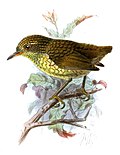Chlamydera
| Chlamydera | |
|---|---|

| |
| Fawn-breasted bowerbird (Chlamydera cerviniventris) | |
| Scientific classification | |
| Kingdom: | Animalia |
| Phylum: | Chordata |
| Class: | Aves |
| Order: | Passeriformes |
| Family: | Ptilonorhynchidae |
| Genus: | Chlamydera Gould, 1837 |
| Type species | |
| Calodera maculata Gould, 1837
| |
Chlamydera is a genus of passerine birds in the bowerbird family Ptilonorhynchidae that are found in Australia and New Guinea.
The birds in this genus build "avenue-type" bowers which consist of two parallel walls made of vertical sticks and pieces of grass.[1]
Taxonomy
[edit]The genus Chlamydera was introduced in 1837 by the English ornithologist John Gould to accommodate Calodera maculata Gould, the spotted bowerbird, which is therefore the type species by monotypy.[2][3] The genus name combines the Ancient Greek χλαμυς/khlamus meaning "short cloak" with δερα/dera meaning "neck".[4]
Species
[edit]The genus contains five species:[5]
- Fawn-breasted bowerbird (Chlamydera cerviniventris)
- Western bowerbird (Chlamydera guttata)
- Great bowerbird (Chlamydera nuchalis)
- Yellow-breasted bowerbird (Chlamydera lauterbachi)
- Spotted bowerbird (Chlamydera maculata)
References
[edit]- ^ Ericson, P.G.P.; Irestedt, M.; Nylander, J.A.A.; Christidis, L.; Joseph, L.; Qu, Y. (2020). "Parallel evolution of bower-building behavior in two groups of bowerbirds suggested by phylogenomics". Systematic Biology. 69 (5): 820–829. doi:10.1093/sysbio/syaa040. PMC 7440736.
- ^ Gould, John (1837). The Birds of Australia and the Adjacent Islands. Vol. 1. London: self. Plate 3 text, footnote. No plate or page numbers.
- ^ Mayr, Ernst; Greenway, James C. Jr, eds. (1962). Check-List of Birds of the World. Vol. 15. Cambridge, Massachusetts: Museum of Comparative Zoology. p. 179.
- ^ Jobling, James A. "Chlamydera". The Key to Scientific Names. Cornell Lab of Ornithology. Retrieved 31 May 2025.
- ^ Gill, Frank; Donsker, David; Rasmussen, Pamela, eds. (February 2025). "Lyrebirds, scrubbirds, bowerbirds, Australasian treecreepers, Australasian wrens". IOC World Bird List Version 15.1. International Ornithologists' Union. Retrieved 31 May 2025.
